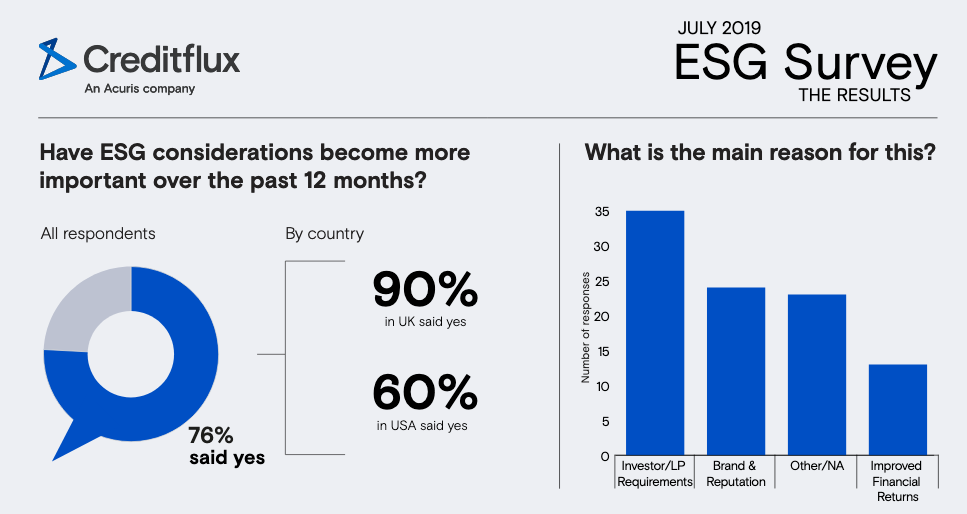Asset managers are starting to open their wallets and billfolds to companies with their core businesses in environmental, social and governance (ESG). As more clients demand to see that their money is making a social impact as well as generating returns, it could help continue to bring ESG investing to the forefront in the capital markets.
More and more, asset managers are purchasing ownership stakes in ESG businesses, developing ratings tools to screen ESG investments and hiring the necessary specialists. For example, per a report in the Financial Times, “Schroders, the UK’s second-largest listed asset manager, bought a majority stake in BlueOrchard Finance, an impact investing fund manager.”
“We are seeing more and more clients looking to have a social impact beyond just purely financial returns with their investments. The mood music is changing,” said Peter Harrison, chief executive of Schroders.
Not All About Profits
Based on a survey of subscribers to Creditflux, an Acuris company, the common notion that investors primarily seek funds for performance didn’t apply to environmental, social and governance (ESG) themed investing. According to 95 survey respondents, only 13 said performance was the main driver.
According to 95 survey respondents, 35 said the primary reason ESG strategies is starting to gain traction in the capital markets is because of demand from institutional investors. In addition, about 25 percent of respondents said their organization was beginning to adopt ESG strategies to enhance their brand.

ESG is still trying to break through to the mainstream in the financial realm, but a new research report from Corbin Advisors helps to clarify common misconceptions for institutional investors and corporate executives.
The Corbin research, based on data from an ongoing study comprising 500+ institutional investors and nearly 100 Investor Relations Officers at top U.S. companies found that:
- 76% of investors assert ESG has become a greater factor in their investment process over the last two years.
- 73% report the “G” is important to critical to their investment decisions, compared to only ~30% for the “E” and “S.”
- 48% of investors identify Data Quality/Access, particularly for Small-caps, as the top frustration when it comes to ESG factors.
- Over 75% of IROs report they have identified material factors impacting their company.
The research, conducted in concert with the University of Connecticut, also identified several key takeaways for companies looking to better integrate ESG factors into company performance measurement and operations:
- ESG reports are one input for investors in their comprehensive research approach; a low ESG score will not necessarily result in a sell decision
- ESG is not a one-size-fits-all approach; it is critical to identify materiality factors for your industry and then conduct the same analysis for your company based on key stakeholder views
- While resources and budgets are more challenging for small-caps, it is critical to communicate where you are in your ESG journey; investors are looking for progress, not perfection
ESG ETF Plays to Consider
One ETF to consider is the Xtrackers MSCI USA ESG Leaders Equity ETF (NYSE Arca: USSG), which was developed in collaboration with Ilmarinen, Finland’s largest pension insurance company. The expense ratio for USSG is 0.10%, which is well below the average cost of 0.39% for ESG funds, making it ideal for investors who are also seeking a low-cost solution to add ESG to their portfolios.
While ESG ETFs are still vying for market share in the ETF space, it appears to be progressing with the advent of new products meeting demand. In fact, sustainability is one DWS’s four core values, not only from an investment perspective, but also as a financial market participant.
USSG seeks investment results that correspond generally to the performance, before fees and expenses, of the MSCI USA ESG Leaders Index. In order for companies to be included in the fund, the methodology includes a comprehensive screener that filters out alcohol, weapons, gambling, and other controversial products or activities.
For more market trends, visit ETF Trends.
